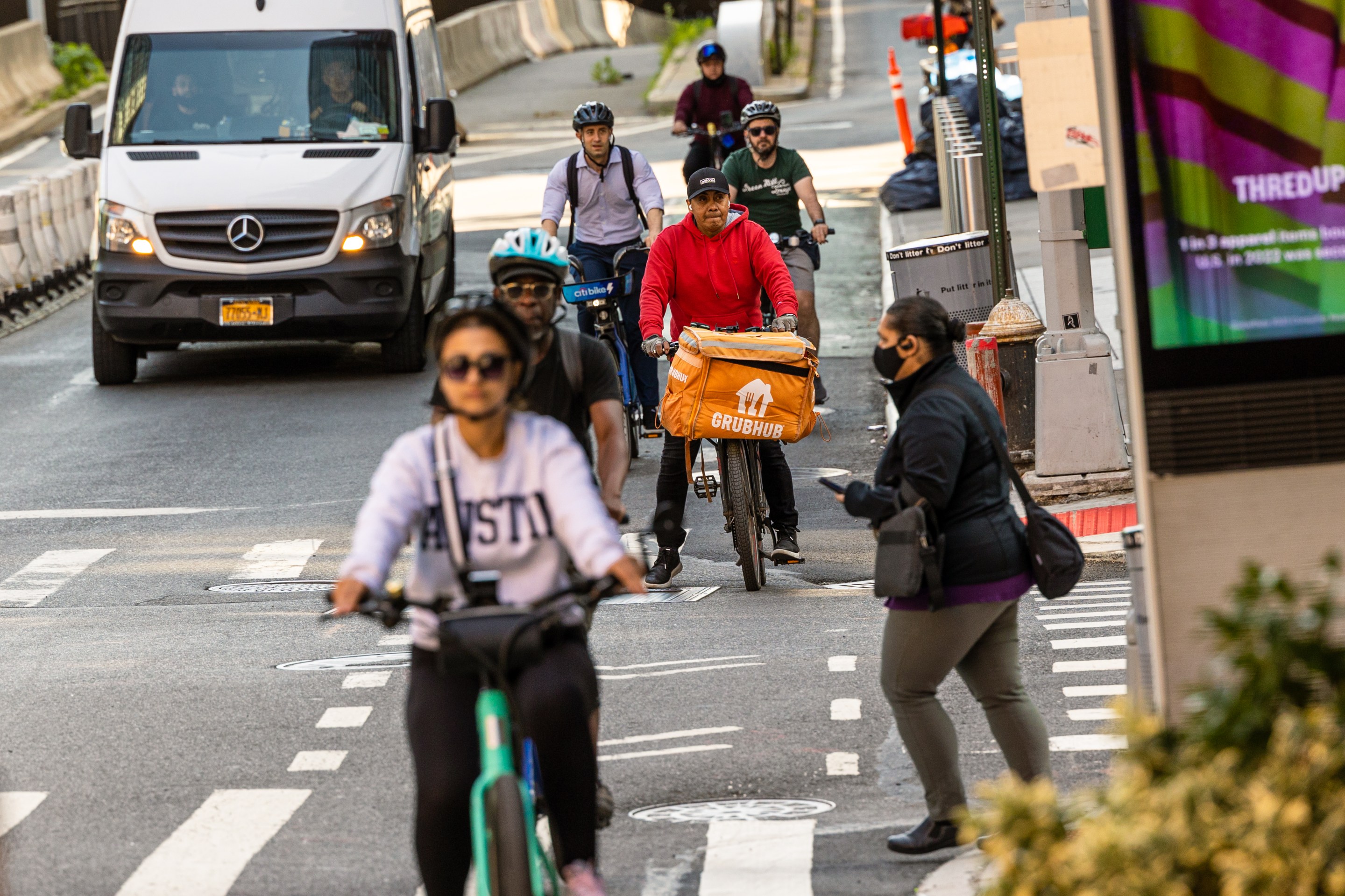Justice delivered.
A Manhattan judge on Wednesday tossed out a lawsuit brought by several major tech firms attempting to strike down the proposed minimum pay rate for the city’s nearly 65,000 delivery workers.
Manhattan Supreme Court Judge Nicholas Moyne ruled against the app-based food delivery companies — clearing the way for the city to implement a long-delayed and much-needed wage hike for workers who brave dangerous roads and hostile weather conditions to bring food directly to New Yorkers, many of them wealthy.
“Multi-billion dollar companies cannot profit off the backs of immigrant workers while paying them pennies in New York City and get away with it,” said Ligia Guallpa, executive director of the Worker’s Justice Project, which organized Los Deliveristas Unidos in 2020.
BREAKING: Years of organizing, mobilizing & advocating are paying off! NYC Courts have ruled against the apps, in favor of implementing minimum pay for delivery app workers! #Deliveristas who keep our City running are one step closer to the fair wages they are owed. 1/2 pic.twitter.com/fH9TbJa4Dh
— Workers Justice ✊🏾 (@workersjusticep) September 28, 2023
Just days before the city’s first-in-the-nation minimum wage for delivery workers was set to take effect back in July, Uber, DoorDash, GrubHub, and Relay, all claimed in separate suits that the Department of Consumer and Worker Protection had set the pay rates based on "fundamentally flawed and biased" data.
“The Department developed and assessed its new rules based on flawed data resulting from biased surveys and unrealistic assumptions that amount to little more than wishful thinking,” Uber attorney Karen Dunn wrote in its 102-page lawsuit.
Today, delivery workers, who are considered "independent contractors" by the app-based delivery companies, make just $7.09 per hour on average, excluding tips.
Now, barring further legal action, workers will start receiving a minimum wage of $17.96 an hour on the first day of each app’s next full pay period (likely some time next month), rising to nearly $20 in 2025, according to a spokesperson for the DCWP.
Moyne’s decision exempts a smaller app-based delivery service company called Relay, which is not consumer facing and whose workers take home an average of more than $30 an hour after tips, according to Relay’s attorney Adam Cohen.
“Today’s decision protects those couriers and allows Relay, a local NYC startup, to continue to find opportunities for even more delivery workers to benefit with high earnings. Today’s ruling further ensures beloved local restaurants, many of which are also small businesses, will continue to be able to rely on Relay to help them make ends meet,” said Cohen, of the firm Walden Macht and Haran LLP.
One of the apps’ arguments was that the minimum pay rate would force workers to limit the distances to which they travel, thereby “potentially harming consumer ordering ability and decreasing demand for food orders from certain restaurants,” mostly impacting “less densely populated areas, low-income communities, and outer boroughs.”
But, according to Moyne’s 43-page ruling, DCWP took that concern into account, noting that most orders are being placed in ZIP codes with the highest income, as Streetsblog has previously reported.
Further, Moyne wrote, the city’s main argument stands: “some consumers’ inability or unwillingness to pay for the cost of their labor does not justify limiting workers’ income.”
A spokesperson for Uber called out the city for continuing to “lie to workers and the public,” claiming that the law will put thousands of New Yorkers out of work.
And spokespeople for both DoorDash and Grubhub said they are disappointed with the judge’s decision and will continue to evaluate their legal options.
The new rate follows a law passed by the City Council back in 2021, which required the DCWP to set a minimum pay wage for delivery workers. An initial proposal of $23.82 an hour was watered down in March.
“I am thrilled by today’s ruling that rejects efforts by delivery app companies to further block the implementation of minimum pay for thousands of delivery workers," said Comptroller Brad Lander, a former Council member. "Now that the preliminary injunction has been denied, thousands of delivery workers at DoorDash, Uber, and GrubHub will finally receive the raises they have been entitled to for almost 10 months."






